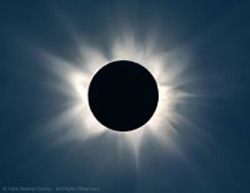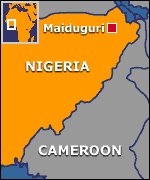An editorial in the Pittsburgh Post-Gazette (March 8) from a Nigerian clergyman working in Pittsburgh, which I will write about in a near-future post, got me to thinking about what Nigerians really think about their country, who they are, and where they are going.
 One question that I've had is what relationship Nigerians have to the Church, whether Anglican, Catholic, or Pentecostal. The relationship is important to understand -- Nigerian politicians and clergymen talk about what Nigerians want and what they believe, and people like me, who are most definitely not Nigerian and have never visited the country let alone the continent, have to trust them. But what if the way those politicians and clergymen talk about the world is so different from how we talk about it that their presentation of Nigerians and their needs is hopelessly distorted to our ears?
One question that I've had is what relationship Nigerians have to the Church, whether Anglican, Catholic, or Pentecostal. The relationship is important to understand -- Nigerian politicians and clergymen talk about what Nigerians want and what they believe, and people like me, who are most definitely not Nigerian and have never visited the country let alone the continent, have to trust them. But what if the way those politicians and clergymen talk about the world is so different from how we talk about it that their presentation of Nigerians and their needs is hopelessly distorted to our ears?Today's total solar eclipse, which started in Brazil, crossed the Atlantic and then covered a swath of countries on the Gulf of Guinea and up into Niger and Libya (6 Nigerian states experienced total eclipse), provides a window into what a visit to Nigeria might be like, and what we might learn about the flock led by such organizations as the Anglican Church of Nigeria.
First, as the eclipse approached, some news organizations published warnings, in part to avoid the religiously motivated violence that followed the 2001 eclipse in Borno State. As This Day (Lagos) pointed out on March 27:
Eclipse occurrence is not new in Nigeria. One occurred in 1898, another one in 1947 and that of 1959. The most recent was in 2001, the very particular case in Borno State that people did not understand. According to the Information and National Orientation Minister, Mr. Frank Nweke, government said it was nothing ominous in such occurrences. "The Federal Government once again reminded Nigerians about the impending solar eclipse, otherwise known as the eclipse of the sun. This incident occurs at new moon and only if the moon passes between the sun and the earth, which causes the brightness of the sun to be replaced, momentarily, by the black disk of the moon. This does not happen very often but it is expected to take place on March 29.Now, the Mail & Guardian Online (South Africa) reports on today's response to the eclipse:"I will like to inform Nigerians that solar eclipses are occurrences within the solar system, whereby the moon is directly between the sun and other planets, including the earth, our planet. Many of us would recall that in June 2001, some parts of the world including Nigeria experienced solar eclipse.
"I know it is natural for people to be frightened and react terribly to unusual incidents but I urge Nigerians and foreigners resident in Nigeria not to panic over the expected eclipse. It is not expected to have any real damaging effect, only on social and psychological discomforts are envisaged.
"However,, since eclipses are now of interest not only to scientists but also to the public, I passionately appeal to all Nigerians not to look at the sun directly because it may cause eye ailments that may lead to blindness in the long run. This is why scientists use a special type of glasses or other devices to view solar eclipses. I therefore strongly advise people to stay indoors for the period the eclipse is expected to last", the minister advised.
...
From a religious point of view, an eclipse has certain implications. Uluocha reiterated that when the lunar eclipse that occurred in 2001 at the Northern part of the country, it caused a lot of distractions in the sense that the Moslem communities, especially the Almajiris, went on rampage. They thought that the light of the moon was darkened because of the sins of the people.
"They went out to look for the infidels who were accused of being responsible for the darkening of the light of the moon. As far as they were concerned, it was unnatural for the light of the moon to be darkened when it was supposed to be shining very bright. So, they went out destroying properties, hotels, churches, killed non-Moslems, prostitutes, native doctors amongst other things. They felt that what happened was as a result of the sin of the people", he said.
...
[Dr. Ernest] Afiesimama advised that people should not regard the eclipse as if something has gone wrong in the universe or wanting to know if it is a bad omen, whether the gods are angry or it is diabolical and so many speculations that may be expected of people who are not sensitised in the atmospheric phenomenon. From his point of view, there is nothing to panic about the eclipse.
Shouts of "Allah Akbar!" (God is greatest) rent the air in parts of Kaduna, northern Nigeria on Wednesday as a four-minute eclipse turned daylight into darkness.I do not wish to make Nigerians look foolish. Far from it. When I saw my first solar eclipse (it was only partial), I was overwhelmed by a sense of smallness. Despite having known the true nature of a solar eclipse since I was a small child, I was still awestruck by the grand movements of these celestial bodies, so far away and out of our control. Some react to eclipses, as I
Many residents ran indoors before the eclipse started. Some did so for fear of looking at the phenomenon directly and damaging their eyes.
Others did so in the belief that that it was a satanic development. The eclipse was experienced in 11 of Nigeria's 36 states.
Musa Abubakar, a Kaduna resident, told the Deutsche Presse-Agentur that scientists' claims that it was a mere expression of nature were not sacrosanct.
"Why Nigeria? Why Kaduna, if not because our sins are legion?" he asked, even after he was told that other countries would also experience it.
Kabuna resident Amina Yusuf also believes the eclipse was God's way of warning Nigeria to turn away from sin. Another resident insisted it was conjured by witches and wizards.
"I did not allow my children to go to school today since we have been hearing on radio and television that there would be an eclipse," Fati Sale said.
Teacher Ezekiel Zubair said he deliberately stayed outdoors to see the eclipse "for a few seconds, because it may be a once-in-a-lifetime experience".
Muslim cleric Abu Thanni said the eclipse was Allah's way of showing that he is "omnipotent".
Pastor Joseph Aku quoted the Bible to buttress his view that the eclipse was a divine event. His text read: "The time is coming when I will make the sun go down at noon and the earth grow dark in daytime. I the Sovereign Lord have spoken."
An eclipse in 1989 led to rioting in Nigeria's predominantly Muslim north as gangs burnt and looted homes and hotels to "atone for the sins of infidels". [emphasis mine]
 did, by reveling in the grandeur they evoke; others, perhaps because of that same sense of smallness, make calls to God to save them from their sin.
did, by reveling in the grandeur they evoke; others, perhaps because of that same sense of smallness, make calls to God to save them from their sin.So far, I've seen no reports of violence.
UPDATE: 3/29/2006, 6:46 PM. The BBC reported on the 2001 eclipse-induced violence here. The violence took place in Maiduguri, the town, along with Bauchi, in far northwestern Nigeria where Muslims attacked Christians, ostensibly because of the Danish cartoons, this February.
UPDATE 2: 3/29/2006, 7:02 PM. "The world isn't ending." Or so says the Nigerian Ministry of Information and National Orientation (?):
"The solar eclipse is not an evil occurrence. It is not the end of the world. There is no need to panic. It is a wonderful expression of Nature."
No comments:
Post a Comment